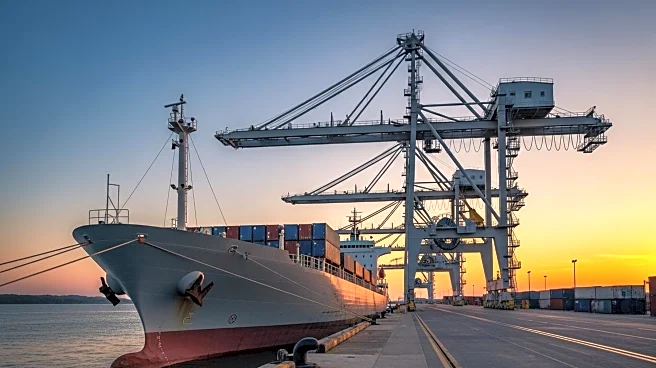What's Happening?
The National Association of Waterfront Employers (NAWE) is urging Congress to incorporate the 'Strengthening American Maritime Dominance Act' (H.R. 3842) into the Fiscal Year 2026 National Defense Authorization Act (NDAA). This legislation aims to expand the Capital Construction Fund (CCF), enabling U.S. marine terminal operators to upgrade essential cargo handling equipment. The initiative is designed to modernize port infrastructure without imposing costs on taxpayers. NAWE's member companies, operating at 16 of the 17 U.S. defense strategic seaports, play a crucial role in the nation's strategic sealift. The proposed expansion would allow private marine terminal operators to defer taxes and reinvest in new or replacement equipment, with a focus on safer, cleaner, and more efficient operations. The legislation includes provisions to support domestic manufacturing and enhance national security by prohibiting the purchase of equipment manufactured in China using CCF funds.
Why It's Important?
The expansion of the Capital Construction Fund is significant for several reasons. It promises to strengthen America's ports, boost domestic manufacturing, and enhance national security by transitioning away from Chinese-produced cargo handling equipment. This modernization is crucial for preventing future supply chain disruptions, similar to those experienced during the COVID-19 pandemic. By allowing private reinvestment through the CCF, the initiative is expected to stimulate economic growth, create jobs, and support resilient trade operations. The measure also aligns with Buy America provisions, ensuring that investments contribute to U.S. jobs and industry, thereby supporting workforce safety and economic stability.
What's Next?
If the legislation is included in the NDAA, private marine terminal operators will be able to begin reinvesting in modern equipment, potentially leading to significant upgrades in port infrastructure. This could result in enhanced efficiency and security in cargo handling operations. The proposal's progress will likely be monitored closely by industry stakeholders, including NAWE, as well as political leaders and economic analysts. The outcome of this legislative effort could set a precedent for future infrastructure investments and policy decisions related to national security and economic resilience.
Beyond the Headlines
The expansion of the Capital Construction Fund could have broader implications for U.S. maritime policy and international trade relations. By reducing reliance on Chinese-manufactured equipment, the initiative may influence geopolitical dynamics and trade negotiations. Additionally, the focus on domestic manufacturing and workforce safety could lead to long-term shifts in industry standards and practices, promoting sustainable and secure operations within the maritime sector.










